At age 31, Ozu's narrative mastery was already apparent
A Story of Floating Weeds (1934) is a silent black and white film later remade as Floating Weeds in 1959 in audio and color. I first watched Ozu's remake of "A story of Floating Weeds", then viewed the earlier version with a comparative mindset. At the time of the remake, Ozu was age 56. Floating weeds is absolutely masterful, and not surprising given the director-writer's experience and access to wider range of tools (audio, color, etc.). The precursor film, A story of Floating Weeds, is very similar to the remake. Many scenes are virtual copies. The characters, although with different names, are essentially the same.
For the average movie goer, especially those without much study or knowledge on Japan, Floating weeds is by far the more accessible and recommended film. A story of floating weeds is a great watch for those that really wish to view Ozu's oeuvre and study the filmmaker or some aspect of Japanese cinema or Japanese history/society.
In viewing both films, one can sense a difference in the technological tools, the state of filmmaking, and cultural/societal influences. It's interesting, for example, to compare the few scenes of domestic violence. In the 1934 version, the hitting looks 'heavier' but there is no sound. In the 1959 version, the hitting looks 'lighter' but the sound cues make it seem more aggressive. Both viewings are disturbing, nonetheless, but it is interesting to see these scenes present with a similar outcome using different techniques; that consistency of impact demonstrates Ozu's directorial and narrative skill. He obviously knew what outcome he sought in both his 31-yr old and 56-yr old selves and could achieve it with different sets of tools.
It's remarkable that, at age 31, Ozu had a very strong grasp of techniques to achieve narrative vision. That at age 56 he felt the prior 1934 film story, itself, was well-tuned and not needing major changes is truly incredible. It seems one cannot escape the director's urge to display ego in this day and age. We have so many filmmakers who modify original story materials they work with at will, often without any logical or aesthetic advantage, simply because they can, or because they feel impotent; they want others to feel their creative stamp even more than making great film. Peter Jackson and the Lord of the Rings is a great example of that phenomenon, changing Tolkien's sources severely and utterly changing the nature of characters, plot lines, and often not for the better. If one changes something, they should improve it; if they don't improve they either have a poor ego issue or are simply not good at assessing the quality of their craft. Again, it shows great maturity and confidence that Ozu understood what made a quality narrative and there was no need to try to one-up the prequel or even himself in the remake. Great pasta is simple; do we need to inject it with novel flavors custom mixed by a pasta bartender? Are we afraid our customers will get tired of the great pasta we made to begin with?
Compared to the 1959 version, the characters of Otoki and Otaka in this film were stunning when presented side by side. I couldn't help but think they were mother and daughter. They were visually hypnotic together.
The music accompaniment - or rather the 90 minute Piano sonata - was okay. I don't know enough about accompaniments to silent films to judge confidently, but I would be intrigued to hear something else, especially something more 'Japanese'.
The 1934 version, in a comparative side by side viewing to the 1959 version, feels less full and perhaps more rushed. It works with 30 less minutes of film time. Although the plot came through just fine in the 1934 film , the 1959 version allows viewers to savor the characters and emotions more satisfactorily. Nevertheless, the Story of Floating Weeds was impactful and certainly worth a watch for the more eager Ozu viewers.
For the average movie goer, especially those without much study or knowledge on Japan, Floating weeds is by far the more accessible and recommended film. A story of floating weeds is a great watch for those that really wish to view Ozu's oeuvre and study the filmmaker or some aspect of Japanese cinema or Japanese history/society.
In viewing both films, one can sense a difference in the technological tools, the state of filmmaking, and cultural/societal influences. It's interesting, for example, to compare the few scenes of domestic violence. In the 1934 version, the hitting looks 'heavier' but there is no sound. In the 1959 version, the hitting looks 'lighter' but the sound cues make it seem more aggressive. Both viewings are disturbing, nonetheless, but it is interesting to see these scenes present with a similar outcome using different techniques; that consistency of impact demonstrates Ozu's directorial and narrative skill. He obviously knew what outcome he sought in both his 31-yr old and 56-yr old selves and could achieve it with different sets of tools.
It's remarkable that, at age 31, Ozu had a very strong grasp of techniques to achieve narrative vision. That at age 56 he felt the prior 1934 film story, itself, was well-tuned and not needing major changes is truly incredible. It seems one cannot escape the director's urge to display ego in this day and age. We have so many filmmakers who modify original story materials they work with at will, often without any logical or aesthetic advantage, simply because they can, or because they feel impotent; they want others to feel their creative stamp even more than making great film. Peter Jackson and the Lord of the Rings is a great example of that phenomenon, changing Tolkien's sources severely and utterly changing the nature of characters, plot lines, and often not for the better. If one changes something, they should improve it; if they don't improve they either have a poor ego issue or are simply not good at assessing the quality of their craft. Again, it shows great maturity and confidence that Ozu understood what made a quality narrative and there was no need to try to one-up the prequel or even himself in the remake. Great pasta is simple; do we need to inject it with novel flavors custom mixed by a pasta bartender? Are we afraid our customers will get tired of the great pasta we made to begin with?
Compared to the 1959 version, the characters of Otoki and Otaka in this film were stunning when presented side by side. I couldn't help but think they were mother and daughter. They were visually hypnotic together.
The music accompaniment - or rather the 90 minute Piano sonata - was okay. I don't know enough about accompaniments to silent films to judge confidently, but I would be intrigued to hear something else, especially something more 'Japanese'.
The 1934 version, in a comparative side by side viewing to the 1959 version, feels less full and perhaps more rushed. It works with 30 less minutes of film time. Although the plot came through just fine in the 1934 film , the 1959 version allows viewers to savor the characters and emotions more satisfactorily. Nevertheless, the Story of Floating Weeds was impactful and certainly worth a watch for the more eager Ozu viewers.
Was this review helpful to you?







